|
| |
|
| |
| |
Would you like to pay a tribute to Sylvia
Send
us your stories and memories.
And photographs, if you have any.
|
|
Horseytalk.net Special Interview
|
|
"I was so pleased to read the interview
with Sylvia, because she deserves recognition for everything
she has done for both horse and rider. I first met Sylvia
in 1994 at a lecture and demo she gave in County Durham.
I had already read her articles in Horse & Rider
as well as The Classical Seat, and they changed my equestrian
life completely. Hearing her words of wisdom and then
seeing her in action consolidated my feeling that here
was the inspiration I had been looking for. I think it
is not too much to say that Sylvia’s teachings
probably saved my life, because some of the things I
had been taught not too long before this revelation had
destabilised my seat to the extent that I had several
nasty falls resulting in injury, and I’m sure things
would only have got worse.
|
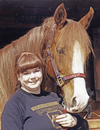 |
|
Adopting the correct
classical seat enabled me to ride more safely and effectively,
for which I owe Sylvia a great debt of gratitude.
I am also indebted to her for encouraging and inspiring
me in my own writing career. Over the years she has generously
promoted, supported and encouraged me, and whenever things
have got me down she has always managed to help me see
the light at the end of the tunnel.
I could go on for pages to describe the many ways in
which this remarkable lady has helped me, but I just
want to say, Thanks a thousand times, Sylvia, for everything!
"
Lesley Skipper |
|
"Sylvia has been an inspiration to me and thousands
of other people all over the world. She has transformed
the lives of countless horses as well as people. Her
tireless work towards a better deal for horses is amazing,
especially regarding the methods of training dressage
horses and a better way of riding.
She has given me something to aspire to, and is the direct reason that I am now
writing on the subject of classical dressage myself -
something I would never have dreamed of, say fifteen
years ago, before I joined the Classical Riding Club.
There are not many people in the world as genuine, generous and talented as Sylvia
Loch, and when we meet such a person, we should give
her all the support and praise she deserves. She has
encouraged many people such as myself and her enthusiasm
has sent ripples throughout the world.
"
|
|
|
"I’ve just read your interview with Sylvia Loch and thought I would email before I forgot! I became aware of Sylvia through Horse and Rider magazine for which she was writing on a regular basis some years ago. I bought the Classical seat book and then found the CRC (classical riding club) online and joined. Through attending events at Eden Hall in Kelso with the club and having been privileged enough to have had some lessons from Sylvia I was hooked on classical methods of riding. I went to Portugal to Quinta Do Archino where I had a week of lessons with both Sylvia and D Francisco de Braganca on the lusitano horses. The CRC is a very friendly club and I’ve
met people who are now very close friends and who will
remain so and I am proud to say that I am an acquaintance
of Sylvia.
|
|
Only this week I attended
a show where Sylvia was judging the Iberian horse classes
and true to form she had a minute to chat and say hello.
Sylvia is forthright and should rightly be considered
an inspiration to aspiring dressage riders. She has influenced
me and many people I know. "
Alison Ainsley |
|
|
| |
Scotland is famous for its lochs. But as far as riders are concerned,
especially dressage riders, there is only one loch: Sylvia Loch
- Author of no less than seven acclaimed equestrian
books , which have been translated into three languages
and published around the world, including the most famous of
all, The Classical Seat, which has just be completely revised, up-dated
and re-published.
- Star of eleven instructional DVDs, which
sell in 35 countries, including the latest, Sensitive
Schooling Vols I and II, Collection, Explored and Confirmed,
which has just been released.
- Founder of The
Classical Riding Club, which has just been
recognised by the British
Horse Society as its first Independent
Partner, a special category it has established for respected
associations.
- Founder of the Lusitano Breed Society of Great Britain, which
this year celebrates its 25th anniversary and was established partly in
memory of her husband, Lord Henry Loch, a former cavalry instructor
who first introduced her to the Classical Horse and Classical
Riding.
|
|
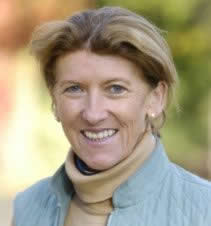 |
|
- An international judge of Lusitanos, she is regularly invited
to judge competitions in Australia, Brazil, New Zealand and
throughout the United States.
- A Supporting National Trainer for the ABRS Jeffress Scholarship
Trust in Scotland
- An accredited instructor in Portugal, she has just been awarded
the equivalent of a Fellowship by the Portuguese Equestrian
Board, the only British rider to be granted such an honour.
- Teacher, adviser and friend of hundreds if not thousands
of riders, both professional and amateur, around
the world.
|
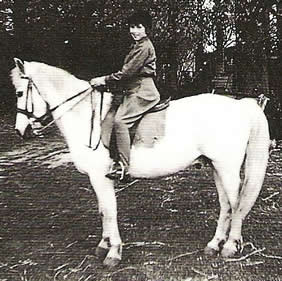
Sylvia on Tommy...
note the footwear, Clarks school sandals!
She only got her first pair of jodhpur boots at 12 |
And it all started with her first pony, Tommy and a deep
love of the countryside.
“He was very sharp indeed. He took me hunting, 'took' being the operative word. It was terrifying most of the time but I always wanted more!” she says.
“We lived in the deepest countryside and I enjoyed the
freedom having a pony meant. There were few neighbours near
us, especially not my own age, so the ponies were my constant
companions. I loved the closeness of them and the fact in
those days we could ride all day without seeing a road in
sight. Over hill and dale and beside frozen lakes and so
on. Where we lived in Scotland was very beautiful and I just
went where I wanted. There were two huge estates close by,
one with an absentee landlord and I felt I owned the land,
the wonderful trees and the ornamental lakes. Such beauty
all around - very inspiring.“
“At the time, I never for a moment thought I’d end up where
I am today. “But I was always hungry for knowledge.
I was also quite a perfectionist and worked very hard at
what I liked doing.
|
|
My father could turn his hand to anything.
He started as a businessman, became a dairy farmer and ended
up a portrait painter. My mother wrote poetry. We were all musical. There were animals everywhere. I was never lonely because there was so much to do. I read a lot and started writing from a very early age - pony stories of course.”
Sylvia admits she also owes a deep debt of gratitude to the
Linlithgow and Stirlingshire Branch of the Pony Club, where
she says she was the one with the less than perfect pony.
“At the Linlithgow & Stirlingshire Branch I learnt
excellent stable management and a modicum of sound horsemanship,
which included jumping cavelletis with my arms folded, and
how to ride cross country in a civilised fashion. Instruction
in those days was thankfully traditional and based on sound
cavalry principles, such as sit firm in the centre of the
saddle, hands and legs down and treat your pony’s mouth as
sacred. Where did that rule go?“
|
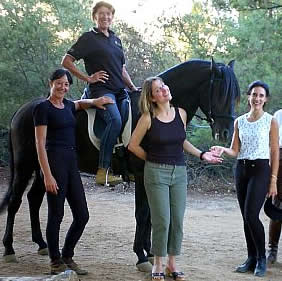 |
|
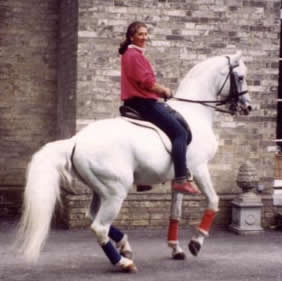
|
By the age of 15, people were bringing me ponies to school.
From this, developed a small business to keep everyone occupied
and happy as well as pay for the hay. Out of this grew my
small but efficient Kaimes Riding School in the Pentland
foothills, near Kirknewton where by the time I was doing
A-levels,I was also running pony camps in the summer and
giving lessons in the ring to improve position. I often found
myself teaching the mums and dads too.
“As regards exams - regretfully, apart from the Pony
Clubs, I never took any. Pony Club Exams
were actually quite tough when I was a child. It’s
very nice, therefore, to have this recognition from Portugal.” .
Think of Sylvia Loch and most people think of Portugal. Many
think she was brought up there. No so.
|
|
Sylvia & her daughter >>
“ I went there first at the age of 22/23 to run a discotheque! I left my safe publishing job in London and moved there because it was an amazing opportunity and a huge challenge. The disco thing was merely a chance to travel. But it also meant hard work, lots of responsibility. But it was also the greatest fun. I met some amazing people - including my husband Henry Loch. And in between working, I rode. And that's where I learned about classical dressage having before just been a hunting, jumping rider.“
Before long, with her husband, Henry, she was running a big dressage academy first in Loule in the Algarve and then back home near Clare in Suffolk where at one time they had 22 Lusitano School masters. “We were a little ahead of our time,“ says Sylvia with a wry smile.
|
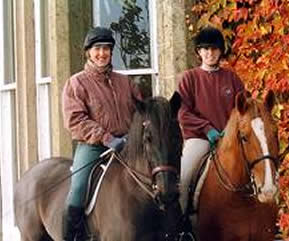 |
|
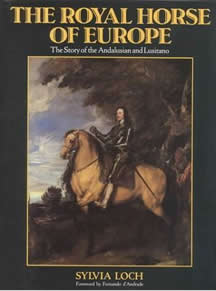
|
Then suddenly in 1982 just after the birth of their daughter,
Henry died leaving Sylvia without her mentor and soul-mate.
She was forced to give up the school but was determined that
people should know about their wonderful Lusitanos. "I
went to J A Allen, the publishers, and discussed the idea
of writing a history of the horses of Spain and Portugal."
I never dreamt that it would turn into a voyage of exploration
taking us back to before the time of the Romans.
The result was 'THE
Royal Horse of Europe'. This was described by Horse & Hound
in l986 as 'the equestrian book of the year'. It also gave
my teaching a huge boost especially as I was teaching on
these highly sensitive horses.
"Imagine my surprise when a month after publication in 1986 I was invited to
Buckingham Palace. The Queen was celebrating the Treaty of
Windsor – 500 years
of friendship between Britain and Portugal – and I was invited
to attend the State Banquet being given for the Portuguese
President. It was all pretty mind boggling but very exciting."
|
|
“Because of the book, which had taken years to research,
I was now being asked to give talks and lectures. One of
the most memorable was to a group of art experts at the Royal
Academy in London! I was quite scared. But afterwards
they all came up to me and said how much they had learned! Whilst
they knew about equestrian art, they had no idea about
the breed of horse those artists were painting and
now felt able to discern the difference. That was a
really good feeling because my whole lecture was about the
type of horse people like Van Dyck and Velasquez were painting,
why they rode them and then how everything changed when the
Oriental breeds came into this country and the English TB
was born! It seemed that they had never thought about
that before. But I had. Hence my book.”
|
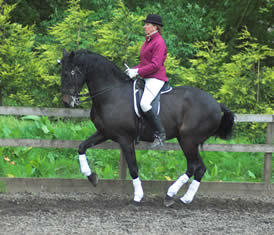 |
|
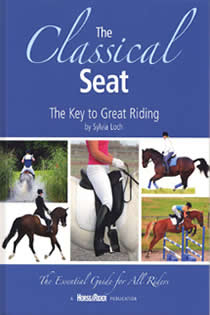
|
All this interest in the Iberian horse meant Sylvia was becoming more and more
in demand. To give demonstrations. To write for newspapers and magazines She
was also competing in dressage. But this was not where her heart lay. She was
finding much greater satisfaction and motivation in being creative. She saw
teaching, demonstrating, lecturing and writing as the way forward.
“After The Royal Horse, I wrote The
Classical Seat which was only a small
paper back but it caused a huge furore in the horse world because nobody had
ever written about the rider's seat in such depth before. I got attacked
by a few elderly gentlemen who seemed more concerned about their nether
regions than learning how to sit on a horse correctly. Whilst the arguments
raged on, my book simply sold more and more copies. Within as many years
it had gone to seven editions.“
“ I then decided to study and write the History of
Dressage, another big and important book, which has
been translated into French and German and is this year going
into a second edition in Germany. Its proper name is Dressage,
the Art of Classical Riding. It has been seen as the reference
book of all time for dressage enthusiasts.
|
|
I can be quite academic when I am motivated and I spent
three years researching the book and sourcing a lot of original
material. But again I am amazed it is still going but obviously
very pleased.
“Two years later I published The
Classical Rider, a
book I never believed anyone would buy, let alone gain me an award from J A Allen,
my publisher. It was basically a biography yet it sold more copies than
any other Allen book that year in its first six-months of publication. To launch
the book, I demonstrated with two of my horses at the indoor riding school at
Buckingham Palace and did a full dressage test with only a cord in my horse’s
mouth.
“As a result, the book was warmly reviewed all over the globe, provoking
more letters and confidences than one ever dreamed possible. People completely
unknown to me still write to me today to say how much courage it
has given them. I feel humbled when people speak of inspiration, but maybe
it just shows anyone can make a silk purse out of sow’s ear – including
me. ”
|
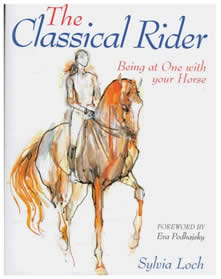 |
|
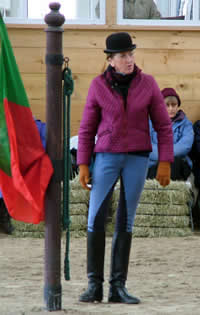
|
The success of these books led to Sylvia deciding to found the Classical
Riding Club. She did this as a way of giving something back to all those people
who had demonstrated their interest and support in what she was trying to achieve
for the ordinary rider.
“I also felt that The
Classical Riding Club would encourage
other teachers and trainers, especially those who for reasons beyond their control,
had often remained undiscovered. I knew there were many out there who should
have been recognised, but who – perhaps through their dislike of
the staged examination system – had remained unknown to the very people
they might have helped.
“ I like to think CRC has re-addressed the balance, even although we cannot
officially approve anybody. What we can do is support, encourage and help
teachers and trainers to follow their own star. Also, not to be afraid
to swim against the flow when that is in the best interests of their pupils both
equine and human.
“I also wanted to provide a self-help source for people riding at home
to feel they belonged to something special, global and totally
committed to the horse's education and happiness.
|
|
There are hundreds of societies and clubs which are motivated
by shows and competitions. I felt the time had come to offer
a more thinking, academic approach to riding, to help people
know where to go, what to read, who to follow, how to make life
better for their horse and provide a source of inspiration.
People have to sign our Charter to join CRC and for many people,
that commitment changes their attitude to their horse and indeed
their life.
”
Sylvia’s publishing career now switched from a trot to
a canter.
“After the books, it was a natural progression to put all
the instruction down into films. This has been very creative,
finding a new medium in which to explain, show, demonstrate and
put it all together in a meaningful way. The beauty of working
live to camera is you can show everything, faults as well as
triumphs, little things as well as big things. How to, how not
to, how horses respond to quiet gentle aids, and how the rider's
position is everything. How can any horse be in balance if the
rider is out of balance? This is not taught enough.
“I feel my ground-breaking DVD Balance and Bodywork is
an absolute must for all riders. It shows riders how to balance
on the ground before they ever get on their horse... and you
would be amazed how people have no idea when they start. I also
feel proud of my two children's DVDS, Getting On and Staying
On. The same principles apply to kids as they do to grown up
riders. You just put it across more simply.
”Today Sylvia is as much part of the dressage world as
a piaffe. Nobody can imagine the one without the other.
“I never sought fame. But fame has found me. I think it's
because I'm accessible. Look, I had a title once... as Lady Loch
I was expected to be snobbish and aloof... I couldn't be like
that. People who use their titles to be distant do so, I suspect,
because they are insecure. I think I am comfortable in my own
skin and therefore I didn't... don't ...need to put on airs and
graces. I'm pretty direct. Although I am considered 'famous'
it hasn't changed me as a person. I'm still a bit mad, still
very enthusiastic, still love to help people and their horses.
I love life. I love what I do. But at the end of the day I am
still independent. I actually love solitude. Writers really need
that. That's why I love living where we do in Scotland. In the
early morning I walk my dogs and savour the peace and the quiet. That's
when and where and how I do my thinking. It's such a valuable
time. Without it, I'd go mad.
|
“I do find it difficult to keep up with everyone in
the horse world but CRC is a wonderful vehicle for reaching
out to old friends, students and readers. By writing a monthly
Editorial, publishing a Blog on line, they can hear from
me but without my devoting my whole day to dashing off emails!!! Mind
you, even so... it's hard...I do sometimes feel, help - stop
the world - I want to get off. But I am sure that I’m
not alone in feeling like this.”
Sylvia Loch has achieved so much, helped and advised so many people all over
the world. Does she still have any ambitions left?
“Yes,” she says.
“I really want to see dressage judging changed. To be horse
friendly, to respect the horse as a delicate, sensitive creature, not a macho,
super-charged, machine. People are far too impressed by big movement, huge
extensions... where has the ballet of riding gone, one wonders?
“Dressage tests too. I'd love to see the whole mark system to be closer
to what I devised for the Classical Riding Club and what has proved so ground
breaking. British Dressage have already implemented some of our Rules since
we published them, but I'd like to see more done. And maybe some consultation
for courtesy's sake.
|
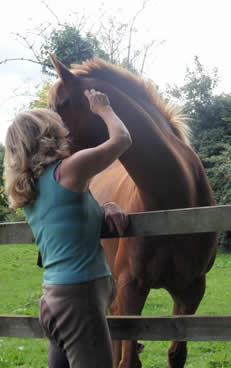 |
|
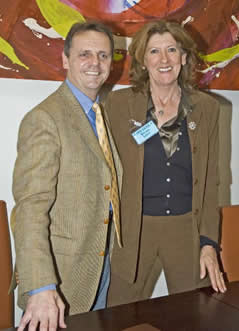
|
“It's time we saw Rider Marks become much more important. Where people
get rewarded for quiet and correct riding. Where others are properly penalised
for corrupting the FEI rules, for example, lightness of the forehand. How
dare judges reward riders where the horse is massively overbent from taut reins
and a strong harsh seat driving them into unrelenting hands. It's a travesty."
“No, I am not the washing rein type of person either. I want to see
horses properly on the bit because they are properly engaged
and are light in the shoulders and accept the bit without being driven. Instead,
accepting the bit because they 'want' to find your hand. And because your hand
is light as the result of correct aiding. Why can't judges be trained to understand
the difference?"
“I would like to see extra classes for one-handed riding tests where
it's much harder to cheat in this way."
“I would like to see a system where there is some way riders who have
trained their own horses, not bought themselves into the sport, can be rewarded."
|
|
“I would like to see the powers that be work with
people like me to see how we can all help the sport and the horses.
Until people really care about the horses rather than mechanical
perfection and look for artistry as well as accuracy, I fear
dressage will not captivate the public.
“I guess I got started along this path, because I saw in the sensitive
Iberian horses something very wonderful and spontaneous. And
what they showed me, I found worked for all horses... all breeds. And horses
work well for me because of this.
“For some reason my whole life has been carved out for
me in a way which has not been of my own making but which has
evolved because of my passion and beliefs. Hard to explain without
sounding sentimental, but if you are open to things, things tend
to happen.”
Thank you, Sylvia.
We promise we’ll try to live up to your standards.
|
| |
|
| |
|
|
